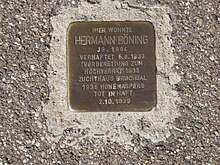Hermann Böning
Hermann Franz Adolf Böning (born May 18, 1894 in Heidelberg ; † October 2, 1939 near Asperg ) was a German politician ( KPD ) and resistance fighter against the Nazi regime . From 1929 to 1933 he was a member of the Baden state parliament .
Life
Hermann Böning, the son of a coppersmith who worked for the railway, grew up with two younger brothers in Heidelberg's Weststadt . After attending primary school , he completed an apprenticeship as a locksmith between 1908 and 1911 . From 1914 to 1918 he had to serve in a railway construction company during the First World War . After the war he worked as a locksmith in Heidelberg, joined the Reichsbahn and became a locomotive driver .
In Heidelberg, Böning joined the Spartakusbund in 1919 and the Communist Party of Germany (KPD) in 1920. In 1923 Böning became a city councilor in Heidelberg. For organizing a prohibited demonstration on December 6, 1923, Böning was sentenced to six months in prison in January 1924. He was banned from working and also lost his seat on the city council. Then worked as an emergency worker and as an advertiser for the Mannheimer Arbeiterzeitung . In 1929 he became the full-time trade union secretary of the Baden district leadership of the KPD and in October of the same year he was elected to the Baden state parliament (constituency 20, Heidelberg). At times Böning was chairman of the Karlsruhe KPD local group and was elected city councilor there in 1930. From 1931 to 1933 he headed the international workers' aid in Baden and was a member of the extended Baden district leadership of the KPD until 1933. In the spring of 1932, by order of the KPD district leadership in Mannheim , he switched to the sub-district Lörrach - Waldshut as an instructor .
Böning was convicted several times for various violations of emergency ordinances, such as assembly and demonstration bans, as well as for his participation in the so-called "Karlsruhe Town Hall Battle" on May 11, 1931 between National Socialists and Communists. As the main responsible party on the KPD side, Böning was initially sentenced to a two-month prison sentence for dangerous bodily harm, public damage to property and trespassing, which was shortened to one month after an appeal.
After the " seizure of power " by the National Socialists, he fled to Basel in 1933 and initially did illegal border work with the support of the Swiss Communist Party . To this end, he went back to the German Reich several times - equipped with false papers (including to Waldshut, Singen , Freiburg , Kirchzarten , Villingen and Konstanz ), where he met with comrades to organize the communist resistance and to distribute smuggled pamphlets. On August 5, 1933, Böning was arrested near Ettlingen and imprisoned in the Karlsruhe district prison. One of his arms was broken there. On February 2, 1935, he was sentenced to six years in prison by the Karlsruhe Higher Regional Court "for preparation for high treason ... in unity with forgery of documents" . On February 8, 1935, he was admitted to the Bruchsal men's penitentiary and transferred to the Hohenasperg fortress on March 23, 1936 .
Exactly 30 days before his actual release, on October 2, 1939, Böning is said to have had a fatal accident. The files say that he was killed in an accident with the institution's own truck on the way from Hohenasperg fortress to Asperg. The driver could no longer control the speed of the truck, so that the rear trailer, on which Böning was riding, hit the wall at the Löwentor. As a result, Böning and other inmates traveling with him were thrown down. Böning suffered a fatal skull fracture. There are serious doubts about this official version. Since nothing happened to the driver of the car, it seems reasonable to assume that the accident was intentionally caused and that Böning was murdered.
Honors
Stumbling blocks were laid for Böning in Heidelberg (Kaiserstraße 42) in 2011 and in Karlsruhe (Ständehausstraße 2) in 2013 .
family
- Franz Böning (1896–1972), younger brother
literature
- Jörg Schadt (edit.), City Archive Mannheim (ed.): Persecution and resistance under National Socialism in Baden. The situation reports of the Gestapo and the Karlsruhe Public Prosecutor's Office 1933–1940 (= publications of the Mannheim City Archives . Vol. 3). Kohlhammer, Stuttgart 1976, ISBN 3-17-001842-6 , pp.
- Werner Röder, Herbert A. Strauss (ed.): Biographical manual of German-speaking emigration after 1933 . Volume I: Politics, Economy, Public Life . Saur, Munich 1980, ISBN 3-598-10087-6 , p. 77.
- Paul Sauer: Baden-Württemberg, state with parliamentary traditions: Documentation. State Parliament of Baden-Württemberg, Stuttgart 1982, ISBN 3-923476-00-0 , p. 194.
- Böning, Hermann . In: Hermann Weber , Andreas Herbst (ed.): German communists. Biographical Handbook 1918 to 1945 . 2nd revised and greatly expanded edition. Karl Dietz Verlag, Berlin 2008, ISBN 978-3-320-02130-6 .
Web links
- Entry: Franz Adolf Hermann Böning in the Stadtlexikon Karlsruhe.
- Short biography on the “Initiative Heidelberger Stolpersteine” website.
- Short biography on the page “Learning Place of Civil Courage & Resistance”.
- Speeches by Hermann Böning in the Baden state parliament in the digital collections of the Badische Landesbibliothek
| personal data | |
|---|---|
| SURNAME | Böning, Hermann |
| ALTERNATIVE NAMES | Böning, Hermann Franz Adolf |
| BRIEF DESCRIPTION | German politician (KPD), MdL Baden, resistance fighter |
| DATE OF BIRTH | May 18, 1894 |
| PLACE OF BIRTH | Heidelberg |
| DATE OF DEATH | October 2, 1939 |
| Place of death | Asperg |
